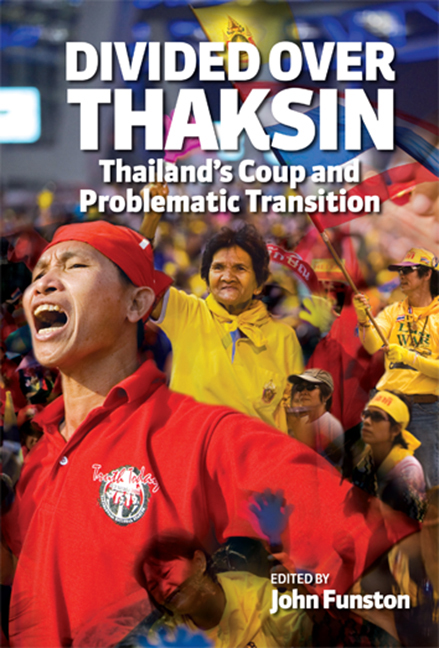Book contents
- Frontmatter
- Contents
- List of Tables and Figures
- List of Contributors
- Preface
- Introduction
- 1 Political Contests in the Advent of Bangkok's 19 September Putsch
- 2 The Tragedy of the 1997 Constitution
- 3 The NESAC, Civil Society, Good Governance and the Coup
- 4 Military Coup and Democracy in Thailand
- 5 Deconstructing the 2007 Constitution
- 6 Thailand's 2007 Constitution and Re-Emerging Democracy: Will Political Polarization Continue?
- 7 Untying the Gordian Knot: The Difficulties in Solving Southern Violence
- 8 Another Country: Reflections on the Politics of Culture and the Muslim South
- 9 Governance in the South: Is Decentralization an Option?
- 10 Tradition and Reform in Islamic Education in Southern Thailand
- 11 The Economy under the Thaksin Government: Stalled Recovery
- 12 The Thai Economy after the Coup
- 13 The Impact of Political Uncertainty on Business
- Index
9 - Governance in the South: Is Decentralization an Option?
Published online by Cambridge University Press: 21 October 2015
- Frontmatter
- Contents
- List of Tables and Figures
- List of Contributors
- Preface
- Introduction
- 1 Political Contests in the Advent of Bangkok's 19 September Putsch
- 2 The Tragedy of the 1997 Constitution
- 3 The NESAC, Civil Society, Good Governance and the Coup
- 4 Military Coup and Democracy in Thailand
- 5 Deconstructing the 2007 Constitution
- 6 Thailand's 2007 Constitution and Re-Emerging Democracy: Will Political Polarization Continue?
- 7 Untying the Gordian Knot: The Difficulties in Solving Southern Violence
- 8 Another Country: Reflections on the Politics of Culture and the Muslim South
- 9 Governance in the South: Is Decentralization an Option?
- 10 Tradition and Reform in Islamic Education in Southern Thailand
- 11 The Economy under the Thaksin Government: Stalled Recovery
- 12 The Thai Economy after the Coup
- 13 The Impact of Political Uncertainty on Business
- Index
Summary
At the beginning of September 2006, army chief General Sonthi Boonyaratglin called for a change of policy on the south, to allow negotiations with insurgent leaders and give him freedom to act as he saw fit without political interference. These remarks contradicted the government' public refusal to negotiate, and marked a very open falling out with Prime Minister Thaksin Shinawatra. Only two months earlier, Thaksin had declared he was handing General Sonthi absolute decision-making power in the south, saying that as a Muslim (albeit from Bangkok rather than the south) he would understand the situation. On 16 September five people were killed and sixty wounded when suspected insurgents exploded six bombs in the southern business centre of Hat Yai. It was the most destructive attack on this city hitherto, and the first time in the conflict that a Westerner (a Canadian) was among the fatalities. Several journalists saw Sonthi' dissent on southern policy, and apparent escalation of this conflict, as closely linked to the 19 September coup.
Nonetheless, discussion of the south did not appear prominently in official justifications of the coup. Initially the focus was on four issues — severe rifts and disunity among the Thai people (more a reference to the mass public rallies in the streets of Bangkok than problems in the south); signs of rampant corruption, malfeasance and nepotism; interference in independent institutions; and actions verging on lèse-majesté. Nor did coup leaders have the south in mind when they later added problems of social injustice, and the existence of a situation that if left unattended could adversely affect security and the economy — this was a claim that violent clashes were about to break out in Bangkok between supporters of Prime Minister Thaksin and the opposition. Coup leader General Sonthi made no direct references to the south, other than on 20 September when he said there would be no change to strategies there.
Still, in a broad sense problems in the south did undoubtedly contribute to the pre-coup opposition to Thaksin. Although Thaksin' heavy-handed policies were popular among a majority, they met with growing opposition from human rights advocates and others in Bangkok' middle class. Their concerns also extended to Thaksin' inability to contain the conflict. September' differences between Thaksin and Sonthi, and the violence in Hat Yai, would have reinforced this consensus against Thaksin.
- Type
- Chapter
- Information
- Divided Over ThaksinThailand's Coup and Problematic Transition, pp. 124 - 134Publisher: ISEAS–Yusof Ishak InstitutePrint publication year: 2009

